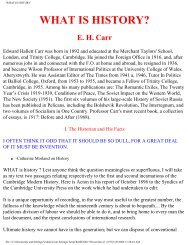The bronze age and the Celtic world - Universal History Library
The bronze age and the Celtic world - Universal History Library
The bronze age and the Celtic world - Universal History Library
Create successful ePaper yourself
Turn your PDF publications into a flip-book with our unique Google optimized e-Paper software.
146 THE BRONZE AGE AND THE CELTIC WORLD<br />
<strong>and</strong> that <strong>the</strong> Q are in <strong>the</strong> outer <strong>and</strong> <strong>the</strong> P in <strong>the</strong> inner ring. With regard to Greek<br />
however, <strong>the</strong> case is different, <strong>and</strong> it is generally considered that <strong>the</strong> dialect of<br />
Herodotus <strong>and</strong> Hippocrates is purely local <strong>and</strong> not necessarily primitive, <strong>and</strong> it has<br />
been pointed out that had <strong>the</strong> original Ionic dialect been a Q tongue, signs of this would<br />
have been apparent in Homer. It is also becoming more common to consider Greek<br />
as having closer af&nities with Persian than with Itahc or <strong>Celtic</strong>, though one wonders<br />
whe<strong>the</strong>r this connection is not being exaggerated as <strong>the</strong> pendulum swings from <strong>the</strong><br />
over-estimated resemblance formerly recognised between <strong>the</strong> two langu<strong>age</strong>s of <strong>the</strong><br />
Classical <strong>world</strong>.<br />
We must, however, agree that <strong>the</strong> Greek part of Rhys' hypo<strong>the</strong>sis will not st<strong>and</strong>,<br />
at least without considerable emendation, nor have we found from our archaeological<br />
investigations any reasons for beUeving that <strong>the</strong> Alpine inhabitants of <strong>the</strong> Swiss<br />
lake-dweUings over-ran as conquerors <strong>the</strong> surrounding regions. <strong>The</strong> evidence, in fact,<br />
points in an opposite direction. <strong>The</strong> deletion of <strong>the</strong>se two points is not fatal to <strong>the</strong><br />
hypo<strong>the</strong>sis, <strong>and</strong> we may still consider that <strong>the</strong>re is, on philological evidence, a pnma-facie<br />
reason for believing that from somewhere in Central Europe, from <strong>the</strong> area which we have<br />
termed <strong>the</strong> <strong>Celtic</strong> cradle, two waves of invaders, of Wiro speech if not of Wiro race, set<br />
out in various directions, that <strong>the</strong> Q was <strong>the</strong> earlier <strong>and</strong> <strong>the</strong> P <strong>the</strong> later, <strong>and</strong> that both<br />
entered Italy <strong>and</strong> <strong>the</strong> <strong>Celtic</strong> l<strong>and</strong>s.<br />
We may fur<strong>the</strong>r admit <strong>the</strong> possibility or even <strong>the</strong> probabiUty, that an ahen<br />
element, not necessarily non-Wiro, had entered <strong>the</strong> <strong>Celtic</strong> cradle before <strong>the</strong> departure<br />
of <strong>the</strong> second wave, <strong>and</strong> that it was to this alien element that <strong>the</strong> labiaUsation was<br />
due. Lastly, we may admit that, though evidence of <strong>the</strong> Q wave into Greece is<br />
non-proven, <strong>the</strong>re is no doubt of <strong>the</strong> arrival of <strong>the</strong> P people, but <strong>the</strong>se P people<br />
spoke a tongue showing greater affinities with Iranian speech, especially in <strong>the</strong>ir names<br />
for weapons <strong>and</strong> o<strong>the</strong>r warUke paraphernalia,' than is to be recognised in <strong>the</strong> o<strong>the</strong>r<br />
P tongues.<br />
Now we have seen from <strong>the</strong> study of archaeological evidence that <strong>the</strong> men of <strong>the</strong><br />
leaf-shaped sword passed at one time into Italy, where <strong>the</strong>y settled near Lake Fucino,<br />
<strong>and</strong> a Httle later some entered <strong>the</strong> <strong>Celtic</strong> l<strong>and</strong>s of <strong>the</strong> west, while earlier a few adventurers<br />
reached Greek l<strong>and</strong>s. Later some refugees from <strong>the</strong> mountain zone reached many parts<br />
9 Schrader (1890) 225-228.







